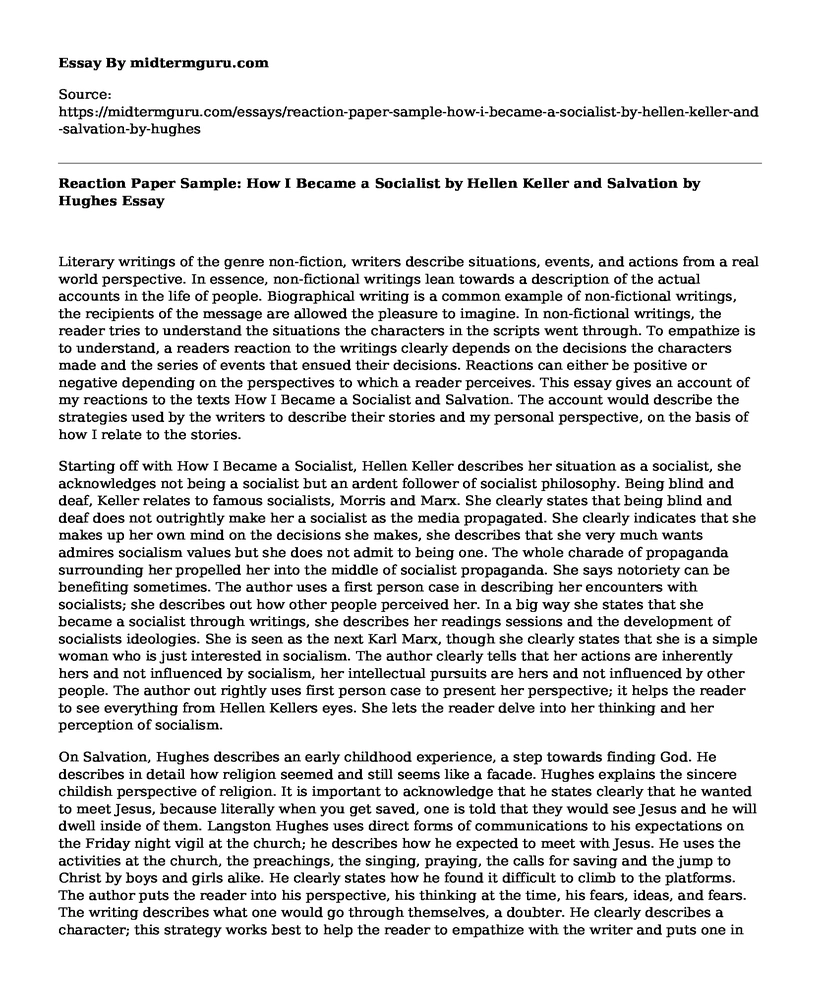Literary writings of the genre non-fiction, writers describe situations, events, and actions from a real world perspective. In essence, non-fictional writings lean towards a description of the actual accounts in the life of people. Biographical writing is a common example of non-fictional writings, the recipients of the message are allowed the pleasure to imagine. In non-fictional writings, the reader tries to understand the situations the characters in the scripts went through. To empathize is to understand, a readers reaction to the writings clearly depends on the decisions the characters made and the series of events that ensued their decisions. Reactions can either be positive or negative depending on the perspectives to which a reader perceives. This essay gives an account of my reactions to the texts How I Became a Socialist and Salvation. The account would describe the strategies used by the writers to describe their stories and my personal perspective, on the basis of how I relate to the stories.
Starting off with How I Became a Socialist, Hellen Keller describes her situation as a socialist, she acknowledges not being a socialist but an ardent follower of socialist philosophy. Being blind and deaf, Keller relates to famous socialists, Morris and Marx. She clearly states that being blind and deaf does not outrightly make her a socialist as the media propagated. She clearly indicates that she makes up her own mind on the decisions she makes, she describes that she very much wants admires socialism values but she does not admit to being one. The whole charade of propaganda surrounding her propelled her into the middle of socialist propaganda. She says notoriety can be benefiting sometimes. The author uses a first person case in describing her encounters with socialists; she describes out how other people perceived her. In a big way she states that she became a socialist through writings, she describes her readings sessions and the development of socialists ideologies. She is seen as the next Karl Marx, though she clearly states that she is a simple woman who is just interested in socialism. The author clearly tells that her actions are inherently hers and not influenced by socialism, her intellectual pursuits are hers and not influenced by other people. The author out rightly uses first person case to present her perspective; it helps the reader to see everything from Hellen Kellers eyes. She lets the reader delve into her thinking and her perception of socialism.
On Salvation, Hughes describes an early childhood experience, a step towards finding God. He describes in detail how religion seemed and still seems like a facade. Hughes explains the sincere childish perspective of religion. It is important to acknowledge that he states clearly that he wanted to meet Jesus, because literally when you get saved, one is told that they would see Jesus and he will dwell inside of them. Langston Hughes uses direct forms of communications to his expectations on the Friday night vigil at the church; he describes how he expected to meet with Jesus. He uses the activities at the church, the preachings, the singing, praying, the calls for saving and the jump to Christ by boys and girls alike. He clearly states how he found it difficult to climb to the platforms. The author puts the reader into his perspective, his thinking at the time, his fears, ideas, and fears. The writing describes what one would go through themselves, a doubter. He clearly describes a character; this strategy works best to help the reader to empathize with the writer and puts one in their shoes.
Both literary writings above is pure non-fiction, they both describe a situation where the authors have found themselves in. In a big way, the authors are manifested in the writings, the writing on How I Became a Socialist, the author writes in the first person, she describes her perspectives, the perspectives of the media, the people around her, and the socialist ideologies at the time and the impacts of the charade of the activities to her. These aspects mentioned makes the works fit in the genre of non-fiction work. On the writing of Salvation, the writer describes how he became saved, the purity and the undifferentiating of his belief that he would meet Jesus is incontestable. The author describes the situation at the church, the people, the pastor, and the children joining the folk and how he had to lie that he is saved in order to avoid being singled out and disappointing the congregation. This is a pure non-fiction literary writing.
Non-fictional writings require imagination, in a big way a reader has to get into the position of the writers. One has to get into the position of the writer in order to empathize and imagine the circumstances on peoples lives. In a big way, one would definitely discredit the need of imagination in non-fictional writings. Imagination is intricately important in non-fictional writings, the imagery of the writer's situation is highly critical.
Cite this page
Reaction Paper Sample: How I Became a Socialist by Hellen Keller and Salvation by Hughes . (2021, May 28). Retrieved from https://midtermguru.com/essays/reaction-paper-sample-how-i-became-a-socialist-by-hellen-keller-and-salvation-by-hughes
If you are the original author of this essay and no longer wish to have it published on the midtermguru.com website, please click below to request its removal:
- Essay on Thoughts and Feelings About the Poem: A Little Learning
- Englisf Literature Essay Sample: Hamlet Seeking Revenge for His Fathers Death
- Essay on A Rose for Emily by William Faulkner: A Mirror up to Time
- Analysis of A View From the Bridge by Cherokee Paul McDonald - Paper Example
- Poetry Analysis Essay on The Fish by Elizabeth
- Literary Analysis Essay on "The Storm" by Kate Chopin
- Essay Sample on Leadership in the Odyssey







